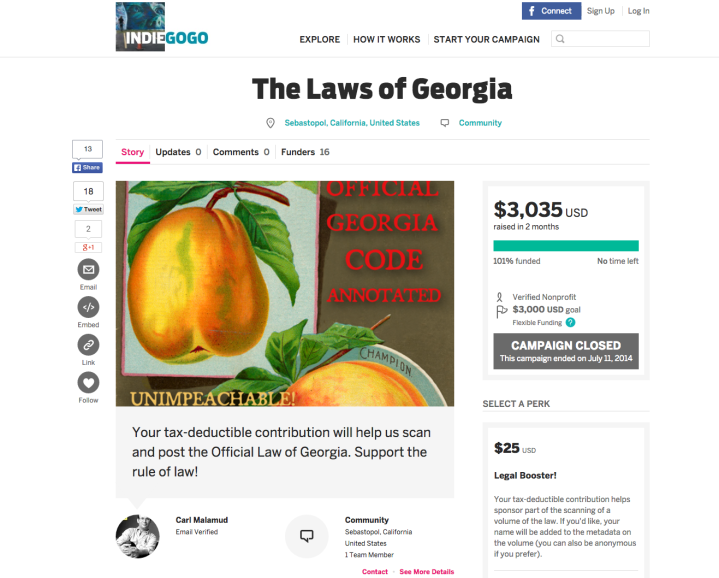
The term “terrorism” is likely being applied a bit too liberally in conservative Georgia, where one man is being sued for — brace yourselves — publishing state laws online. For free. Apparently, so averse is Georgia to the notion of government transparency that the state is willing to take Carl Malamud to court for allowing denizens of the Internet to visit his site, public.resource.org, where they can find the annotated version of the entire state body of law. According to the lawsuit, filed last week, Malamud’s actions qualify as “a form of ‘terrorism,’” which almost seems offensive given the other scenarios to which the term is more commonly used (think Islamic State, 9/11, Boko Haram, etc.).
While the unannotated version of state laws have long been easily accessible to anyone who wishes to search for them, the version that Malamud published is the one that government bodies, agencies, and courts ultimately use to make their decisions. Consequently, Malamud felt that it was necessary that the public see this series of rules and stipulations as well, allowing them to more closely observe the logic by way their legislators come to their decisions. But the Georgia government disagreed with Malamud’s actions, claiming that Malamud’s “18-year-long crusade to control the accessibility of U.S. government documents by becoming the United States’ public printer” violates copyright laws.
Related: France approves ‘Big Brother’ surveillance law
Malamud, however, argues, “It is a long-held tenet of American law that there is no copyright in the law. This is because the law belongs to the people and in our system of democracy we have the right to read, know, and speak the laws by which we choose to govern ourselves.” Malamud continues, “Requiring a license before allowing citizens to read or speak the law would be a violation of deeply held principles in our system that the laws apply equality to all.”

But according to the state, Malamud’s eagerness to make the annotations publicly available infringes upon intellectual property and creative license. “Each of these annotations is an original and creative work of authorship that is protected by copyrights owned by the State of Georgia,” the prosecution contends. “Without providing the publisher with the ability to recoup its costs for the development of these copyrighted annotations, the State of Georgia will be required to either stop publishing the annotations altogether or pay for development of the annotations using state tax dollars.”
Ultimately, the state claims, “Georgia will face losing valuable analysis and guidance regarding their state laws.” This is a bit alarming (and insulting) for the state if true — the notion that publishing the laws somehow renders them obsolete or less valuable seems rather far-fetched, though copyright is indeed a serious issue that has gotten significant attention over the last few weeks. Still, the absurdity of the entire situation has not been lost by the many who scoff at the comparison of publicizing laws and committing jihad.
Malamud has been engaged in the battle to bring government practices and protocol to light for nearly two decades, and has often met with pushback from those in positions of power. But that hasn’t stopped him in 18 years, and we’ve yet to see if Georgia will be able to stop him now.


